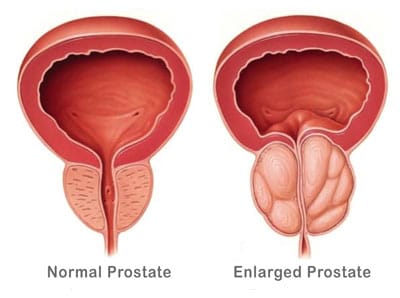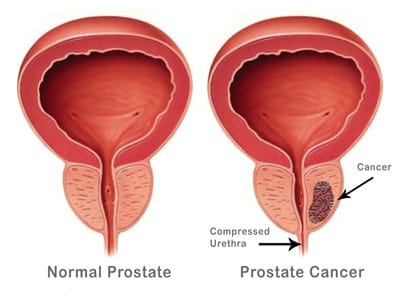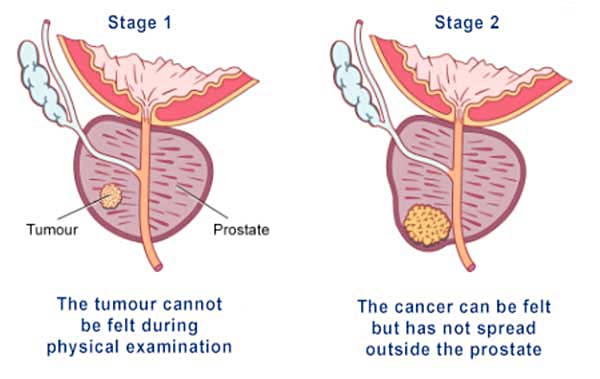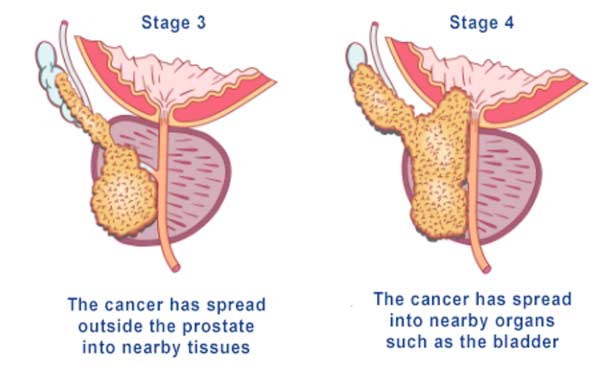
Prostate Problems & Symptoms
The Somerset Prostate Support Association guide to prostate problems. This page is designed to help you understand these problem, identify symptoms and what action to take. Problems with the prostate can manifest themselves in many ways and the buttons below will take you to the relevant section.

What & Where is the Prostate
The prostate is a gland found only in men and is situated just below the bladder. The primary function of the prostate gland and it's 'partner' seminal vesicle, is to secrete a fluid that provides lubrication and nutrition for the sperm produced in the testes. The mix of all three is known as semen
One component of prostate fluid is an enzyme called Prostate Specific Antigen (PSA)
When a man passes urine, it flows from the bladder into the urethra and via a conduit in the prostate, out through the penis. Any pressure on the urethra by an enlarged or infected prostate will manifest itself as a symptom, most likely difficulty in urinating.

Prostatitis – Inflammation of the Prostate
Unlike other prostate conditions, such as prostate enlargement or prostate cancer, which usually affect older men, prostatitis can develop in men of all ages, commonly men aged between 30 and 50. Prostatitis (inflammation or swelling of the prostate) is the most common prostate problem in men under the age of 50.
There are 2 main types of prostatitis:-
Chronic Prostatitis – where the symptoms come and go over a period of several months; it's the most common type and not usually caused by bacterial infection.
Acute Prostatitis – where the symptoms are severe and develop suddenly; it's rare, but can be severe and requires immediate treatment, and is always caused by an infection. Quite often caused by bacteria that leak into the prostate gland from the urinary tract. The prostate can also be infected by sexually transmitted organisms such as Neisseria gonorrhoeae or Chlamydia trachomatis.
Symptoms of Chronic Prostatitis
You may have chronic prostatitis if you have had some of the following symptoms for at least 3 months:
- pain in and around your penis, testicles, anus, lower abdomen or lower back
- pain when peeing, a frequent or urgent need to pee, particularly at night, or "stop-start" peeing
- an enlarged or tender prostate on rectal examination
- sexual problems, such as erectile dysfunction, pain when ejaculating or pelvic pain after sex
These symptoms can have a significant impact on your quality of life but in most cases, they'll gradually improve over time and with treatment.
See a GP straight away if you have these symptoms so that the cause can be investigated.
See TreatmentsSymptoms of Acute Prostatitis
- pain, which may be severe, in or around your penis, testicles, anus, lower abdomen or lower back – pooing can be painful
- pain when peeing, needing to pee frequently (particularly at night), problems starting or "stop-start" peeing, an urgent need to pee and, sometimes, blood in your urine
- not being able to pee, which leads to a build-up of urine in the bladder known as acute urinary retention – this needs urgent medical attention
- generally feeling unwell, with aches, pains and possibly a high temperature
- lower back pain and pain on ejaculation
See a GP straight away if you have these symptoms so that the cause can be investigated.
See TreatmentsEnlarged Prostate
As men get older, the prostate gland increases in size. It is quite common for men to develop a condition called benign prostatic hyperplasia (BPH) or the simpler term benign prostate enlargement (BPE). This is not a cancer and it isn't usually a serious threat to health. Various treatments include:-
- lifestyle changes
- medication
- catheters
- surgery & other procedures
Enlarged Prostate

Symptoms
Here is a list of some symptoms that are usually caused by the benign disease, not prostate cancer. If you have any of these symptoms, please go to your doctor to have them checked as there are very effective treatments that can help these symptoms:-
- Difficulty or pain in passing urine
- Having to rush to the toilet to pass urine
- Frequent trips to the loo at night
- Starting and stopping while urinating
- Dribbling urine
- Feeling you have not emptied the bladder
NOTE! Having an enlarged prostate does not lead to or make you more susceptible to prostate cancer, but it is possible to have both an enlarged prostate and prostate cancer at the same time.
Prostate Cancer

Prostate Cancer
Often, early-stage prostate cancer has no symptoms or signs. It is usually found through a PSA test. If a PSA test indicates that prostate cancer MAY be present, more monitoring and testing is needed to diagnose prostate cancer. When prostate cancer does cause symptoms or signs, it is usually diagnosed in a later stage. Prostate cancer can, in some advanced cases, cause urinary difficulties similar to those for an enlarged prostate. The symptoms and signs of prostate cancer may include:-
- Frequent urination
- Weak or interrupted urine flow
- The need to strain to empty the bladder
- The urge to urinate frequently at night
- Blood in the urine
- Onset of erectile dysfunction
- Pain or burning during urination, which is much less common
- Discomfort or pain when sitting, caused by an enlarged prostate
NOTE! you may experience the following symptoms if cancer has spread outside of the prostate gland. As with all symptoms of prostate cancer, they are serious and you should visit your GP URGENTLY.
- Pain in the back, hips, thighs, shoulders, or other bones
- Swelling or fluid buildup in the legs or feet
- Unexplained weight loss
- Fatigue
- Change in bowel habits
The Stages Prostate Cancer
Prostate cancer is a malignant tumour in the prostate and there are several stages of development. Most prostate cancers develop slowly and do not cause any symptoms. Fast-growing prostate cancer is less common. The risk of getting prostate cancer increases with age. The average age for diagnosis of prostate cancer is 69. Prostate cancer is the most common cancer in elderly men. The survival rate for prostate cancer is relatively high and is still rising.A healthy prostate is about the size of a large walnut and has a volume of 15-25 millilitres. The prostate slowly grows as men grow older. All decisions about the right treatment pathway for you are taken after careful consideration of the classification of the tumour, your prognosis, your general state of health, the availability of treatment options in your hospital, and your personal preferences and values. The most critical factors for selecting treatment are the stage and the aggressiveness of the disease.

